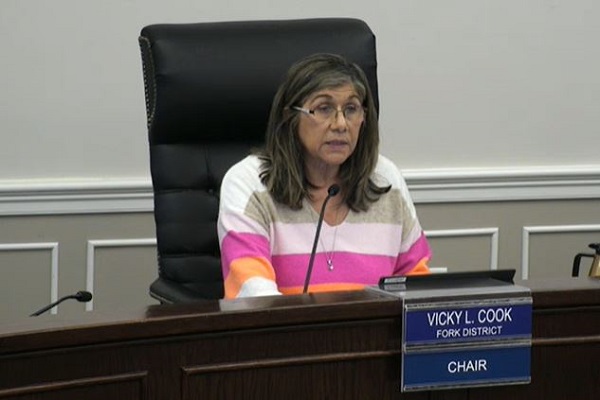The two topics of most general public interest at the 6 p.m. Warren County Board of Supervisors work session on Tuesday, October 10, began and ended that work session with presentations of over an hour’s duration. Those were the Sheriff’s Office operational and budget presentation and Zoning Administrator Chase Lenz’s summary of County Planning Commission and staff recommendations on changes to the zoning rules for short-term rentals. The initiative to have the 100-foot setback requirement either totally removed from the zoning requirements or made an absolute requirement in the name of equal treatment of all applicants despite potential differences in each permitting application has started a firestorm of public opposition and the creation of a new grassroots organization, the Warren County Coalition of Community Associations (W3CA) — to fight and offer alternative options on such matters. We will hear more from them later.
Officially, the Zoning Text Amendments on the table appear to have originated with the board of supervisors, who forwarded them to the planning commission for review and a recommendation last month. Confusion on board members’ parts on why different applications would receive different recommendations was cited. At the October 10 supervisors’ work session, that theme resurfaced. Chairman Vicky Cook wondered why the existing setback requirement was only being enforced by the board 20% of the time. The staff agenda summary addressed this concern:
“The proposed amendment to subsection O to remove the 100-foot setback requirement from neighboring dwellings is recommended by Planning staff in response to a request from the Board of Supervisors that this requirement be reviewed and options be presented to replace the existing requirement. The current placement of this 100-foot setback requirement in the supplementary regulations allows for the requirement to be waived by the Board of Supervisors, which has led to confusion and debate among Board members when deciding whether the setback requirement should be waived. Option A and Option B of the draft ordinance propose separate options for addressing this issue.”
Involved public reaction related to the formation of the above-mentioned W3CA community organizational alliance indicates overwhelming public opposition to these two all-or-nothing options. And the work session staff summary seemed to indicate planning commission agreement with the public push-back. The “Planning Commission Status” portion of the staff summary notes (Bold text added):
“On Wednesday, September 13, 2023, Mr. Henry moved to forward this application to the Board of Supervisors, recommending denial. The motion was seconded by Mr. Kersjes and approved by the Planning Commission by a vote of 4-1. In their discussion, the Planning Commission supported all the proposed changes to the supplemental regulations except for the proposed options to change the 100′ setback requirement from neighboring dwellings. The Planning Commission did not agree with making the 100-foot setback an absolute requirement that cannot be waived, and they also disagreed with removing the 100-foot setback requirement entirely. The Planning Commission indicated a preference for keeping the setback requirement as a supplemental regulation that can be waived by the Board of Supervisors.”
Responsibilities of elected leadership
But apparently, the responsibility of judging Conditional Use Permitting (CUP) requests on a case-by-case basis dependent upon the individual circumstance of each application remains too daunting for some on the board. Chairman Cook responded to the work session staff presentation and board comments:
“Going back to the comment ‘When you’re only enforcing it 20 percent,’ you’re going to get people to come in and say ‘Hey, don’t worry about the planning commission, the board of supervisors will approve it,’ right? I mean, we got to fix that. And it needs to be, in my opinion anyway, standardized where it’s equal for everyone. And not just be subjective. That’s where I’m going with it,” Cook told her colleagues.
Chairman Vicky Cook, file photo here, appears to be the driving force on her board for trying to standardize the 100-foot setback requirement one way or the other so that case-by-case permitting judgments are taken out of the board’s hands. But could such zoning code standardization become discriminatory in its own way, Supervisor Oates wonders? Public and Planning Commission feedback would seem to indicate ‘yes.’
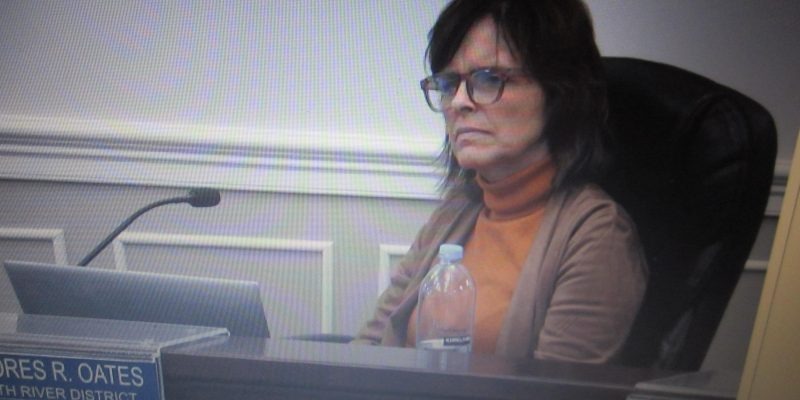
Zoning Administrator Lenz asked if the board was seeking a third option to the two on the table from the board’s original submission on the issue to the planning commission and department. “Can we think about it,” Supervisor Oates asked, leading to some laughter and Cook’s observation, “We’ve been thinking about this for a long time.”
Oates responded that the all-or-nothing options would be “very challenging because every property is unique … and you can standardize and discriminate. — Do you see what I’m saying?” to which Cook replied, “That’s where the criteria of a waiver come in.” Oates noted that the board had “not determined the criteria for a waiver,” seemingly taking them back to square one on a case-by-case analysis of each permitting request, which is what currently exists, without setting the all-or-nothing zoning code criteria as the starting point for a waiver request.
County Administrator Ed Daley noted staff could begin preparing waiver criteria, at least in part appearing to address a difference between locally generated permitting applications and those offered by out-of-state interests.
The discussion continued to indicate internal board division on the best path forward. Oates referenced her own property, noting physical parameters that might lead to varying recommendations from a comparable lot with a different landscape. “If we’re going to standardize it, we can’t standardize it to the point where it becomes discriminatory. Then we’ve swung the pendulum the other way,” Oates observed.
Zoning Administrator Lenz offered to work on some options to bring back to a future work session, which the board seemed to accept as a next step in the matter.
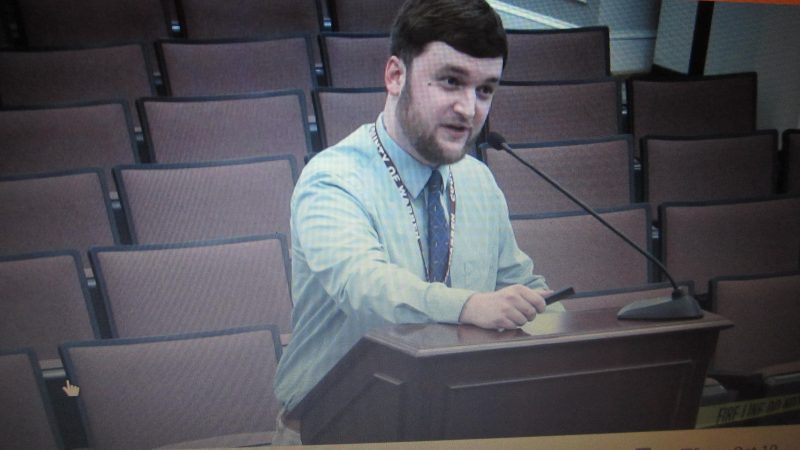
So, where do we go from here, County Zoning Administrator Chase Lenz was wondering after supervisors kicked dueling types of short-term rental zoning standardization around the ‘discriminatory’ table some more. The board seems divided and/or unsure of a path forward.
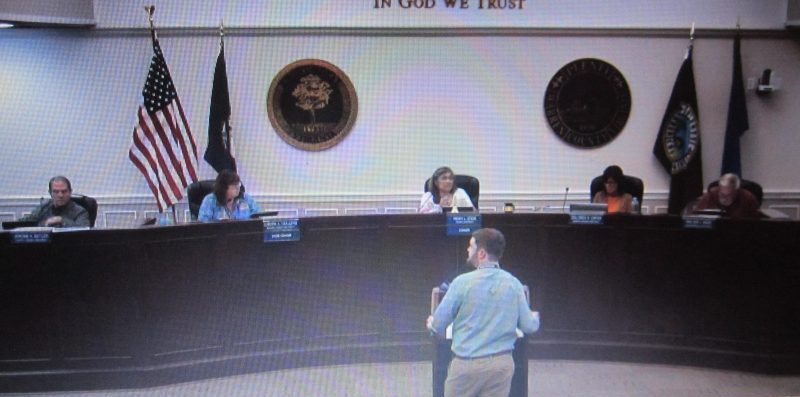
See these closing comments near the meeting’s end, essentially beginning with some observations by Cheryl Cullers at the 3:01:42 mark of the linked County video. The meeting adjourns at the 3:05:39 mark. Lenz’s presentation on the short-term rental zoning amendments issue begins at the 1:58:25 video mark.

But prior to that adjournment, as noted above, there were a number of other staff presentations beginning with the WCSO operational and funding report.
Back to the beginning with WCSO
With past questions about his departmental budget having surfaced without appropriately clear answers for at least one supervisor, South River’s Cullers in particular, with the opening spot in the Tuesday, October 10th work session, Sheriff Mark Butler took to the podium to announce that in response to those questions — “We have actually put a presentation (together) for you.” Butler introduced the departmental staff who would make that presentation, Major Mumaw and Captains Collins and Brogan.
“And we will give you a quick presentation to answer any questions you might have. But we’re very proud of what we’ve accomplished, very proud of where we’re at, and I think you’ll see that in the presentation,” the sheriff said before presenting his staff and their PowerPoint presentations on departmental operations and financing. That presentation begins at the 01:17 video mark with Major Mumaw’s introduction of Captain Brogan, who addressed Court Services and Civil Processes (02:05 to 14:45 video).
Next up was Captain Collins, who addressed Patrol and Operations, including School Resource Officers, Animal Control, K-9 units, Narcotics Detection, and participation in the federal task force on illegal drug distribution investigations, with keen public interest in several of those topics being expressed recently, including questions and responses that were the lengthiest of the three WCSO presentations (14:58 to 1:05:46 of video).
Major Mumaw returned to the podium to address more specifics on Drug Seizures and Arrests in conjunction with the federal task force, during which Sheriff Butler also responded to questions on task force interactions at the federal and state/regional levels (1:05:49 to 1:13:49).
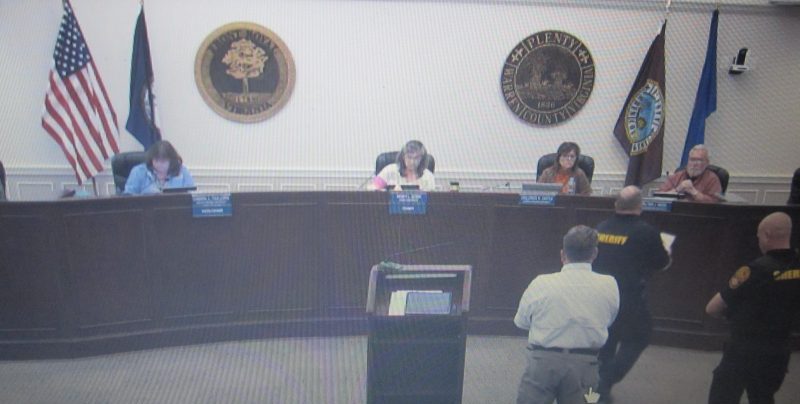
After introducing staff with him, Sheriff Butler told the board, “And we will give you a quick presentation.” However, with all the Q&A surrounding patrol/operational issues in part two of the presentation, “quick” was off the table by about 50 minutes. Below, Sheriff Butler assisted Major Mumaw in fielding questions on task force operational options during final phase of the three-part presentation.
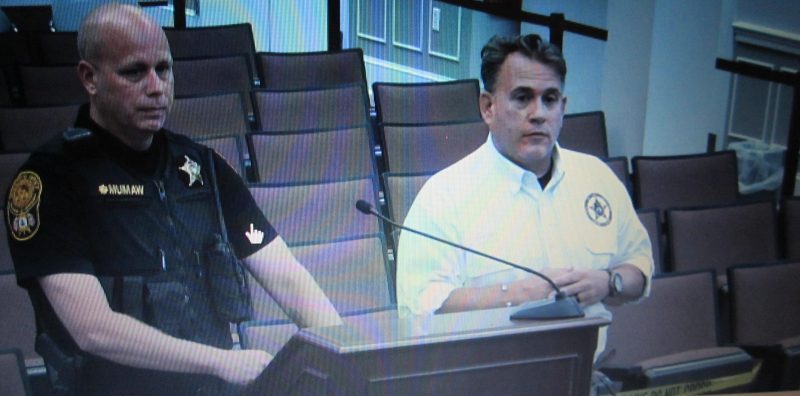
Near the end of those presentations, a question was posed by Shenandoah District Supervisor Walt Mabe (1:13:21), following up on an earlier comment by Supervisor Cullers on why the sheriff’s office was not associated with the regional/state task force. Mabe asked Sheriff Butler, “Why not both?” in regards to the sheriff’s office involvement in a federal task force, but not in the state and regional one since they seem to interact so heavily, as described in the departmental presentation. The sheriff’s response was off-microphone and unintelligible by live-stream or video. We inquired of both as to that response.
Mabe told us that the sheriff essentially said in response to two queries on the matter that if Mabe came to his office, he would tell him anything he wanted to know in that regard. Sheriff Butler concurred, telling us, “I just told him I would discuss this with him at my office, not there.” Mabe said he posed the follow-up question hoping to elicit a public response from the sheriff, which he said he was disappointed not to get.
Other topics the supervisors got staff reports from at this work session were:
- Tourism Update – Joe Petty
- Discussion – State Impact Salary Adjustment – Jane Meadows
- Discussion – Warren County Handbook Personnel Policies & Procedures – Kayla Darr/Jane Meadows
- Discussion – New Position Fire and Rescue (Firefighter/Apprentice EMT) – Kayla Darr
- Discussion – Warren County Treasurer’s Investment and Deposits Policy as a Fiscal Policy – Alisa Scott
- Carryover Package – Alisa Scott
Click here to watch the Board of Supervisors Work Session of October 10, 2023.
royalexaminer.com
https://royalexaminer.com/town-council-votes-unanimously-in-favor-of-upholding-bar-decision-denying-proposed-asphalt-shingle-roofing-on-house-in-historic-district/

